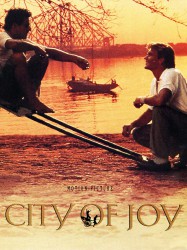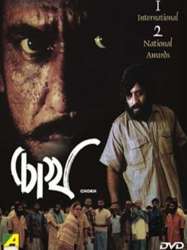Shyamanand Jalan est un Acteur et Producteur Indien né le 13 janvier 1934 à Muzaffarpur (Inde)

Shyamanand Jalan (13 January 1934 – 24 May 2010) was an influential Kolkata-based Indian thespian, theatre director, and actor. He is credited for the renaissance period of modern Indian theatre and especially the Hindi theatre in Kolkata from the 1960s to 1980s. He was the first to perform modernist Mohan Rakesh, starting with his magnum opus Ashadh Ka Ek Din (One Day in Ashad) in 1960 and in the coming years bridged the gap between Hindi theatre and Bengali theatre, by mounting Hindi productions of works by Bengali playwrights, like Badal Sircar's Evam Indrajit (1968) and Pagla Ghora (1971), which in turn introduced Sircar to rest of the country. In 2005, he directed his first and only film Eashwar Mime Co., which was an adaptation of Dibyendu Palit's story, Mukhabhinoy, by Vijay Tendulkar.
Also noted as an actor in stage plays, he is well remembered for his performance as the don in Roland Joffe's 1992 film City of Joy. He also worked with reputed parallel cinema directors. He acted in Mrinal Sen's television series, Tasveer Apni Apni, and later in Arohan by Shyam Benegal, Kahan Kahan Se Guzar Gaya by MS Sathyu, and Chokh (1982) by Utpalendu Chakrabarty.
He co-founded theatre group Anamika in 1955, impresario organisation Anamika Kala Sangam in 1967, and later in 1972, he left Anamika to form his own Padatik theatre group, of which he remained director for the rest of his life; Padatik Dance Center was launched in 1989, a school for Classical and Contemporary Dance in Kolkata. He received the 1972 Sangeet Natak Akademi Award for Direction, awarded by the Sangeet Natak Akademi, India's National Academy of Music, Dance & Drama, and later remained the vice-chairman of the Akademi (1999–2004).
Source : Wikidata
Shyamanand Jalan

- Infos
- Photos
- Meilleurs films
- Famille
- Personnages
- Récompenses
Nationalité Inde
Naissance 13 janvier 1934 à Muzaffarpur (Inde)
Mort 24 mai 2010 (à 76 ans) à Calcutta (Inde)
Récompenses Sangeet Natak Akademi Award
Naissance 13 janvier 1934 à Muzaffarpur (Inde)
Mort 24 mai 2010 (à 76 ans) à Calcutta (Inde)
Récompenses Sangeet Natak Akademi Award
Also noted as an actor in stage plays, he is well remembered for his performance as the don in Roland Joffe's 1992 film City of Joy. He also worked with reputed parallel cinema directors. He acted in Mrinal Sen's television series, Tasveer Apni Apni, and later in Arohan by Shyam Benegal, Kahan Kahan Se Guzar Gaya by MS Sathyu, and Chokh (1982) by Utpalendu Chakrabarty.
He co-founded theatre group Anamika in 1955, impresario organisation Anamika Kala Sangam in 1967, and later in 1972, he left Anamika to form his own Padatik theatre group, of which he remained director for the rest of his life; Padatik Dance Center was launched in 1989, a school for Classical and Contemporary Dance in Kolkata. He received the 1972 Sangeet Natak Akademi Award for Direction, awarded by the Sangeet Natak Akademi, India's National Academy of Music, Dance & Drama, and later remained the vice-chairman of the Akademi (1999–2004).
Le plus souvent avec
Filmographie de Shyamanand Jalan (3 films)
Acteur

La Cité de la joie (1992)
, 2h12Réalisé par Roland Joffé, Paul Verhoeven
Origine France
Genres Drame
Acteurs Patrick Swayze, Om Puri, Shabana Azmi, Art Malik, Pauline Collins, Iftekhar
Rôle Ghatak - Godfather
Note65%





Max, un jeune chirurgien américain, décide, après l'échec d'une opération, de renoncer à sa pratique et de partir en Inde.

Chokh (1983)
, 1h38Genres Drame
Thèmes Le monde du travail, Politique
Acteurs Om Puri, Anil Chatterjee, Biplab Chatterjee, Shyamanand Jalan, Madhabi Mukherjee
Rôle Factory Owner
Note73%





The film is set in during the Emergency period in December 1975. Jadunath a labour union leader, of Jethia Jute Mill in Kolkata has been given death sentence, for the murders of owner Jethia’s brother, and another worker, even though he never committed them. Before dying, he pledges his eyes for donation. However, when the mill owner finds about this, he tries to manoeuvre the medical system to get both the eyes for his blind son. Meanwhile the doctor discovers that the donation papers provided by the Jethia to be fake. Soon the mill workers get united behind the widow of Jadunath and hold protest rally against the injustice.
Producteur

Dada Thakur (1962)
Acteurs Chhabi Biswas, Biswajit Chatterjee
Rôle Producteur
Note76%





The film is based closely on the life of the real-life Dada Thakur, and was made in his lifetime. Dada Thakur (Chhabi Biswas) starts his career with a hand-operated press, with his wife as his assistant. Later he is joined by Nalini Kanta Sarkar, an underground freedom-fighter. Dada Thakur brings out the newspaper Jangipur Sangbad. He campaigns against social evils and earns the ire of the ruling classes. He saves a girl, Lata, from the unwanted advances of Darpanarayan (Biswajeet), scion of the local zamindar. Lata joins the ranks of freedom fighters working with Sarkar. Subsequently, a reformed Darpanarayan too becomes an ardent follower of Dada Thakur and joins the struggle for India's freedom. Dada Thakur's greatest success is when he helps an ordinary man, a petty shopkeeper, get elected as the Municipal Commissioner of Jangipur.
 Connexion
Connexion



